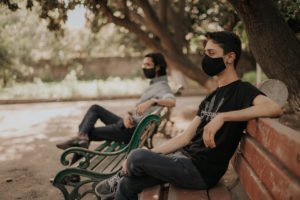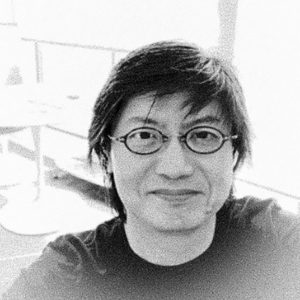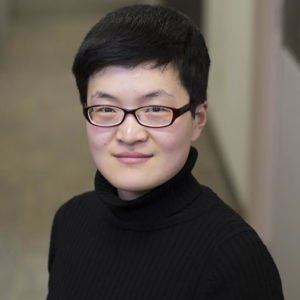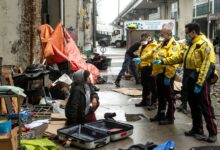The right to live

Nations are responsible for the protection of all their inhabitants, which naturally includes, as a supreme right, the protection of life. But it is also up to governmental figures, at their various levels of power, to guarantee scrupulous compliance with human rights. All this assuming that we are talking about democratic regimes. In other words, in the context of a pandemic, it is up to each country to do everything in their power to protect their citizens, even if this means imposing the enforcement of rules that limit the right to choose or, if you prefer, individual freedom.
This is how the question arises – where is the “defence of human rights” factor in this equation? A question that comes, usually, from anti-vaccination movements (more organized than one might think).
The answer will have various interpretations, but in the light of the defense of the supreme good that is life, it seems clear that the choice of some cannot, under any circumstances, jeopardize the health of others. And here may arise the need for political regimes, based on democratic values, to autocratically impose the rule of mandatory vaccination. And it is within this framework that the fundamental question results from—are we witnessing a paradigm shift regarding the concepts of freedom and democracy? Or are we just clarifying concepts and assumptions of healthy social coexistence?
To try to answer these and other questions that have been raised recently all over the world, with more or less social tension, we listened to two specialists in the matter, although each with a different background.
On the one hand, we have the perspective of someone who has studied the area of Public Policy and all the associated administrative environment – Thaddeus Hwong, associate professor appointed to both the School of Public Policy and Administration and the School of Administrative Studies in the Faculty of Liberal Arts and Professional Studies at York University—and on the other, we look at this matter with a vision ruled by sociological studies—with the help of Dr. Zhifan Luo, an instructor of sociology at McMaster University.
In the end, what is clear is that one’s freedom ends when it interferes with the freedom of another. And as Thaddeus Hwong says: “Leaders are expected to lead”, which bring us to the need to have governments that protect us.
Milénio Stadium: When a citizen refuses to be vaccinated, is he enforcing a fundamental right and his freedom of choice, or is he manifesting an inability to understand public health as a collective good?

Associate professor School of Public Policy and Administration and the School of Administrative Studies in the Faculty of Liberal Arts and Professional Studies at York University. Credits: DR
Thaddeus Hwong: Anti-vaxxers want to exercise their right to choose not to be vaccinated and protected, and when they do so they infringe on others’ right not to be harmed by the anti-vaxxers as the virus is highly transmissible. That’s a misuse of the freedom to choose by the anti-vaxxers. Anti-vaxxers oppose vaccination based on long-debunked science. That’s ignorance. The combination of the two points to the flaws in our democracy that put everyone in society at risk. The recent storming of the Eaton Centre by anti-vaxxers exemplifies that.
MS: In a democracy, are there absolute rights? Is the right to choose what you want for yourself untouchable? Or does the right of choice and self-determination of one human being end where that of another begins?
TH: When the exercise of one right infringes the exercise of another right, what should society do? In my modest opinion, the society needs to decide whether the infringement will do more good than harm in order to make a justifiable decision on whether the infringement should be allowed. Should society allow anti-vaxxers put others in harm’s way? I doubt allowing that is justifiable as it does more harm than good to society. As of now, the Ford government is not doing enough to protect society from anti-vaxxers.
MS: It is well known that all scientific innovation has associated risk factors, and that scientific knowledge does not always lead to the strengthening of consensus, indeed it often opens the way to disagreement and counter-argumentation. What is the role of the politician in the face of the lack of consensus on which public health may depend?
TH: Leaders are expected to lead. When doing the right thing is needed, they are expected to find the courage to do it even doing it will cost them in polls and elsewhere. Given politicians are who they are, they do see what the right thing to do is through the lens of politics. But leaders are expected to rise above that in pursuit of the common good. This is a provincial election year in Ontario. Will voters find the Ford government exhibit the traits of leadership to do what’s right?
MS: To what extent does the political regime become more or less democratic when decisions are taken that limit the freedom of choice of some in the name of defending public health?
TH: Thinking through the imposition of a vaccine mandate helps sketch the contour of democracy. Some might think a vaccine mandate is undemocratic. If democracy is about majoritarian rule, then the imposition of vaccine mandate will actually make society more democratic as anti-vaxxers constitute the minority. Some would argue rightfully so that in a democracy the minority should be protected from harms inflicted by the majority. But in this particular case, does the minority need to be protected from the majority? To start with, what the minority needs to be protected from is themselves, given all the COVID data on the drastic disparities in health outcomes between the vaccinated and the unvaccinated. Is the majority trying to harm the minority? No, in the case of the vaccine mandate the majority is actually trying to protect the minority from themselves. Given that the pain and suffering of the pandemic limit people’s freedom and other democratic rights, could a minoritarian rule by anti-vaxxers be even deemed democratic?
MS: Do you think we are witnessing a paradigm shift from what was considered (until the beginning of the pandemic) to be a democratic regime?
TH: The pandemic exposes the failures of our democracy in protecting all from misinformation and disinformation. People are entitled to their own opinions, but they are not entitled to their own facts. Once people in society cannot even agree on facts, how long before society starts breaking down? As an illustration, Doug Ford’s daughter has been spreading misinformation and disinformation. The Ford government is not stopping her. That says a lot about the state of the kind of democracy we have.
MS: Are there any concerns of the pandemic strengthening political authoritarianism?
TH: Here’s an example that might not be about a current case of authoritarianism but might show how the pandemic can lead to the rise of authoritarianism. The Ford government authorizes children to return to in-person learning. Is it about politics as this is an election year or is it about public health given that the pandemic is raging? It’s claimed to be good for the children, good for the parents and good for everyone. But is it? Teachers will get infected. Students will get infected. Sick teachers can’t teach. Sick children can’t learn. And COVID could leave long-term residual effects on those who are inflected. The Ford government is ostensibly fulfilling people’s wishes. That might help Ford in this year’s provincial election. When a government can inflict harms on society with popular support, that’s a dangerous power for the government to have.
For context, the in-person learning case has at least two policy issues in it. One is education. Another is childcare. They are separate issues, but some people seem to mix them together. Sending children back to schools in this stage of the pandemic will do more harm than good as children could get inflected and some could end up in hospitals. Why does anyone want to put children and teachers in harm’s way? Because schools are deemed to be de facto childcare providers? Because the governments did not provide adequate public childcare to begin with? When politics trump public health, society suffers. In Chicago the teachers’ union took a stand. As of now it’s unclear what any union of Canadian teachers will do.
MS: From your perspective, what impact could anti-vaxers have on global society?
TH: The anti-vaxxers put everyone and everything at risk. The ripple effects are not just limited to aspects on the physical health of all. Misinformation and disinformation hurt democracy, but little has been done by the powers that be to safeguard our democratic health. Politics trumps the common good, and that is a cancer ruining our democratic health.
“The pandemic can be seen as an opportunity to renegotiate about what these rights mean to us as citizens, to Canada as a democracy, and to our human species living in a global society in which a virus developed in one part of the world could spread to the rest of it within months. You may see it as the time for a new social contract.”
Milénio Stadium: When a citizen refuses to be vaccinated, is he enforcing a fundamental right and his freedom of choice, or is he manifesting an inability to understand public health as a collective good?

Instructor of sociology at McMaster University. Créditos: DR
Dr. Zhifan Luo: As a sociologist, I am more used to talking about social forces that shape individuals’ choice, instead of freedom of choice in a normative way. Therefore, I think the more important question here is whether our public health institution has provided easy access to vaccine to the most vulnerable social groups, instead of discussing people who can easily access vaccine but decide not to do so. It is understandable that we put a lot of emphases on individuals’ choice, but what’s equally worth our attention, if not more so, are people who have not been given the opportunity to choose, people who do not have a flexible work schedule, who cannot take a day off and travel to a remote site to get the vaccine. This is collective good, and these are fundamental rights for these people, these taxpayers – to receive accessible public service from the government.
MS: In a democracy, are there absolute rights? Is the right to choose what you want for yourself untouchable? Or does the right of choice and self-determination of one human being end where that of another begins?
ZL: From a sociological perspective, all rights that we hold dear to our heart have a history. They are results of negotiation, conflicts, and compromises among social actors across a long period of time. Therefore, when we talk about certain right, we need to put it in the social and historical context to see where it came from and why it took the shape as it is. In this regard, the pandemic can be seen as an opportunity to renegotiate about what these rights mean to us as citizens, to Canada as a democracy, and to our human species living in a global society in which a virus developed in one part of the world could spread to the rest of it within months. You may see it as the time for a new social contract.
MS: It is well known that all scientific innovation has associated risk factors, and that scientific knowledge does not always lead to the strengthening of consensus, indeed it often opens the way to disagreement and counter-argumentation. What is the role of the politician in the face of the lack of consensus on which public health may depend?
ZL: Yes, it’s true that scientific innovation may generate conflicting rather than conclusive results. Indeed, that’s what makes scientists scientists – they admit the limits of what we have known and open to the uncertainty of what have not. However, this way of thinking is not most people are familiar with – or comfortable with. Because there is a need for certainty in the time of public health crisis. I am not sure if politicians should be – or we should expect them to be – the mediator here for scientists and the general public. Indeed, I think media, particularly science journalists, could take lead in communicating scientific knowledge to the society.
MS: To what extent does the political regime become more or less democratic when decisions are taken that limit the freedom of choice of some in the name of defending public health?
ZL: I would be more concerned when there is alteration of the democratic process, instead of specific policies, made in the name of public health.
MS: Do you think we are witnessing a paradigm shift from what was considered (until the beginning of the pandemic) to be a democratic regime?
ZL: As I mentioned before, from a sociological perspective, our rights and values are all products of social negotiation, conflicts, and compromises. In this way, what means to be a democracy is also negotiated. I do not see a paradigm shift. Instead, I see renegotiation over what our rights are and how we should promote public health during a pandemic while preserving the rights that make us citizens of a democratic country.
MS: Are there any concerns of the pandemic strengthening political authoritarianism?
ZL: For now, what I see is struggles between different discourses and different understanding of rights, public health, and social wellbeing. In these struggles, for sure, values like democracy and concepts like authoritarianism are mobilized to support some discourses. That’s how the renegotiation works – different discourses compete for public attention and support to their arguments. But I will pay attention to if some government regulations made specifically for the pandemic stay there when it’s over and if some government power expanded in the name of public health stay as well. If we come to that point, I would be concerned with a potential authoritarian turn.
MS: From your perspective, what impact could anti-vaxers have on global society?
ZL: People and groups with anti-science perspectives always exist in our time. Anti-vaxer is just one name, and the most recent name, used to describe these groups of people. But the global pandemic did give these groups a common cause across geography and give them a bigger microphone, since everybody is talking about the pandemic and the vaccine right now. Does it mean these groups will stay globally connected after the pandemic? I don’t know but it’s not very likely unless there is another common cause that can bring them together.
Catarina Balça/MS








Redes Sociais - Comentários